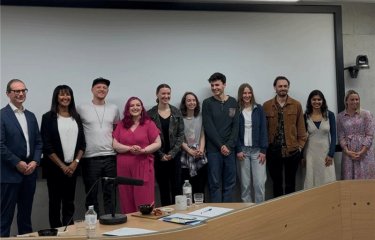What’s it like working for an agency?
28 July 2022

‘Agency life’ is a term used at marketing agencies across the country – but what does this phrase actually mean? To help shed some light on the matter, Tom Telford, President of Digital Marketing at Clarity, recently spoke to students on our Marketing and Digital Communications MA (Online) course about what it’s really like working for an agency.
How would you describe agency life?
I would describe agency life as fun, fast and varied. Working in an agency gives you a really interesting start in your career. I know I work in agencies so this may sound a bit biased, but I think it’s good for everyone to do. It gives people a good insight into how companies run and how communication works between a client and an agency.
Working for an agency is exciting, can offer an amazing work-life balance and a good social scene. Agencies are incredibly people-oriented; our product is our service, and our service is our people. A lot of our agency’s revenue is invested in the development of our employees and their working environment.
As well as agency life being fun and varied, it is also incredibly fast-paced with a lot going on. When you start at an agency, there can be a lot to wrap your head around, so it’s about finding the right agency that suits your character.
In terms of the variation in work, what kinds of roles can you do in an agency?
There’s a real variety of people. For example, in my digital marketing team I have analysts, creatives, designers, copywriters, programmers, strategists, account managers and social media marketers. Within the broader organisation, there are over 100 people who work in communication and PR. That’s quite a different skillset to digital, and very interpersonal. And of course, we have the project managers – the ultimate tier of people actually getting things done! There really are a variety of roles across the business.
If you’re unsure about the route you’d like to take, the best way is to apply for two or three internships or graduate roles during your time at university. Make sure that you’re applying for paid internships as if you’re not being paid then you’re not being valued.
There’s tons of different types of agencies out there and it’s good to learn a bit about all of them as you figure out the best fit for you. Internships with the big network agencies, such as WPP or Havas, who employ thousands of people, will give you insights into how large corporations work. You could also try interning with a smaller agency; maybe one that’s more locally-oriented. Of course, there’s also agencies like Clarity, that blend global reach with a more hands-on boutique feel!
Whatever your trade, you will usually join an agency as an ‘account or marketing executive’ but it can be quick to whip through the ranks of an agency. Junior account execs and account coordinators are really common job titles to come in on, and then you can work your way up to a more senior position and specialise.
What’s the recruitment landscape like for agencies right now?
It’s a really good time to be on a course like Marketing and Digital Communications and looking for a role - there are lots of agencies which are looking to expand their workforce at the moment.
I have been recruiting since 2003 and I’ve never found it so hard to recruit. I find that when I’m interviewing now, I’m being interviewed as much as I’m interviewing. I am essentially selling working for my agency as hard as the candidate is trying to win the job. So, as a graduate, there are ample opportunities in the industry right now.
What should graduates consider when looking for agency jobs?
When I think about why people would work for you, there are three areas I always come back to and these are: money, brains and love. These are the three things to think about when you’re going for a job.
Money: Is the remuneration right? Are you being paid a fair market value? If you’re being paid far more than the market average, then the employer is going to expect a lot more back from you in return. If a job is underpaying, then I wouldn’t apply as it means it’s going to take you a long time to climb the ranks to get to where you should be for your experience level. It’s also worth considering the employee benefits that are on offer. Many agencies offer great staff benefits such as healthcare, unlimited holiday, summer hours and training academies.
Brains: What’s the educational value of the business? Does the company run any training programmes or is there a training budget for employees? In any agency job, you should always be using your brain. In previous roles, I’ve had jobs that offered a competitive salary but I wasn’t challenged and I left. The reality is, if a job is dull and you’re not learning then you will leave.
Love: This is all about the cultural side of the agency and how you’re looked after as an employee. It’s a good idea to look at an agency’s social channels to get a sense of the culture of the business and the kindness of the business. What sort of things do the team do together? Instagram is a great indicator of how good an agency actually is. If it’s just about a free fruit bowl and an office dog then you probably don’t want to work there! It should be deeper than that.
I think the culture of an agency is very much led by the leadership of that business. If you get a good sense of who the leaders are and what they believe, this does tend to filter through to the culture of the organisation.
Your agency is your tribe, so you have to make sure the values of an agency align with who you are.
About Tom:
With 20 years of experience in the industry, Tom has worked for a range of in-house companies and agencies of varying sizes, including a stint at Deloitte, setting up the Cornwall-based digital marketing agency 3WhiteHats and now working for the global communications agency, Clarity, which has offices in Cornwall, London, Amsterdam, New York, San Francisco and LA.
Image courtesy of Clarity





